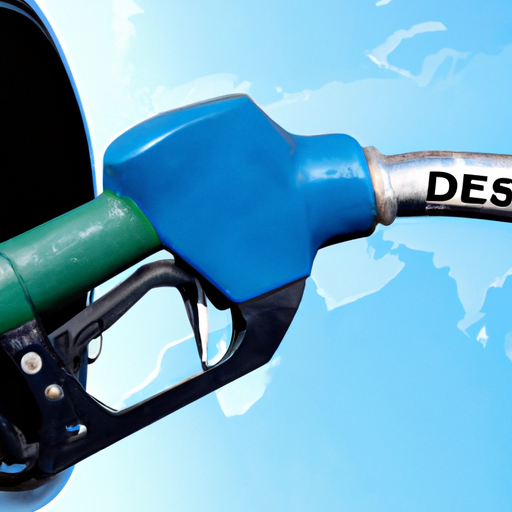Impact of Rising Diesel Prices in Saudi Arabia and Russia on Currency Markets
Effect on the Rouble
The rising diesel prices in Saudi Arabia and Russia are anticipated to have a significant impact on currency markets, with the Rouble expected to experience the most significant weakening compared to other major currencies. This price hike in diesel is likely to result in higher energy costs for Russians during the winter season, making it more challenging for them to cope with the cold temperatures. Consequently, the Rouble may face increased pressure in relation to the dollar, the euro, and other significant currencies.
Effect on the Dollar
While the dollar is not expected to be directly affected by the rising diesel prices in Saudi Arabia and Russia, its strength in comparison to the Rouble may become more prominent. As the Rouble weakens, the relative strength of the dollar may be reinforced within the currency markets.
Effect on the Euro
Similarly to the dollar, the euro is not likely to be directly impacted by the increasing diesel prices. Nevertheless, the euro’s position against the Rouble may become more competitive, further highlighting its strength within the currency markets.
Effect on Other Major Currencies
Although the impact of rising diesel prices in Saudi Arabia and Russia may not be significant for other major currencies, the overall dynamics within currency markets can be influenced. It is essential to monitor these developments and their potential consequences for each major currency.
Understanding the impact of rising diesel prices in Saudi Arabia and Russia on currency markets enables investors to make informed decisions and assess potential risks. By staying informed and considering the effects on the Rouble, dollar, euro, and other major currencies, individuals can better navigate the ever-changing landscape of the currency market.
Plan A: Introduction of a New BRICKS Currency
Objective of the Plan
The objective of Plan A is to introduce a new currency backed by gold, which is expected to make the dollar and euro more competitive with the rouble. This move aims to address the rising diesel prices in Saudi Arabia and Russia and mitigate the potential negative impact on the currency markets.
Expected Impact on the Dollar
With the introduction of the new BRICKS currency, the dollar is likely to experience increased competition in the currency markets. As a result, its value may be affected, causing fluctuations in the exchange rates. However, the exact extent of the impact on the dollar remains to be seen.
Expected Impact on the Euro
Similar to the dollar, the euro is expected to face increased competition from the new BRICKS currency. This could lead to fluctuations in exchange rates between the euro and other major currencies, including the rouble. The precise impact on the euro will depend on various factors, including market dynamics and investor sentiment.
Expected Impact on the Rouble
The rouble, being the currency most directly affected by the rising diesel prices in Saudi Arabia and Russia, is anticipated to face challenges due to the introduction of the new BRICKS currency. The weakened rouble may experience further pressure in the currency markets, potentially leading to exchange rate fluctuations and increased costs for the Russian population.
The introduction of a new BRICKS currency under Plan A is aimed at addressing the currency market impact of rising diesel prices in Saudi Arabia and Russia. While its exact consequences on the dollar, euro, and rouble remain uncertain, this development reflects the efforts of officials to manage potential disruptions in the currency markets.

## Plan B: Backing the Rouble with Gold
The rising diesel prices in Saudi Arabia and Russia have led to concerns about the impact on the currency markets, particularly in relation to the Russian Rouble. To tackle this issue, Putin and his advisors have implemented Plan B, which involves backing the Rouble with gold. The objective of this plan is to strengthen the Rouble and make it more competitive against other currencies, such as the dollar and the euro.
Potential Consequences for the Rouble
Backing the Rouble with gold is a bold move that could have significant consequences. By tying the value of the currency to a valuable and finite resource like gold, Russia aims to increase investor confidence and stability. However, this decision could also lead to volatility in the currency markets. Changes in gold prices could directly impact the value of the Rouble, potentially creating fluctuations and uncertainty.
Comparison to Other Currencies
While the impact of rising diesel prices in Saudi Arabia and Russia is likely to affect multiple currencies, the consequences for the Rouble may differ from other important currencies like the dollar and the euro. The Rouble’s vulnerability to these price increases could lead to a weakening of the currency compared to its counterparts. The dollar’s status as the ruler of currencies, coupled with the euro’s stability, may provide a stronger position in the currency markets in the face of rising diesel prices.
Plan B’s objective of backing the Rouble with gold aims to strengthen the currency’s position in the market. However, potential consequences and comparisons to other currencies highlight the importance of closely monitoring the impact of rising diesel prices in Saudi Arabia and Russia on the currency markets.

## International Events Likely to Affect Currency Markets
Political Developments
The currency markets are sensitive to political developments, especially those involving major oil-producing countries like Saudi Arabia and Russia. The recent rise in diesel prices in these nations has the potential to impact currency valuations. However, it is worth noting that the impact may be more significant on the Russian Rouble compared to other major currencies like the US dollar and the Euro. As a result, the Russian population may face the consequences of increasing energy costs, particularly during the winter months. This scenario highlights the vulnerability of the Rouble in comparison to the dominant position of the dollar in the currency market.
Economic Factors
Economic factors play a crucial role in determining the impact of rising diesel prices on currency markets. For instance, the Russian government has considered various strategies to mitigate the potential negative effects. Plans involving the introduction of a new BRICKS currency backed by gold, as well as backing the Rouble with gold, have been discussed. However, the effectiveness of these strategies in stabilizing the currency remains uncertain. The interplay between economic policies, international trade, and energy consumption will shape the currency market impact.
Market Sentiment
Market sentiment is another factor that influences currency markets. As diesel prices rise in Saudi Arabia and Russia, market participants may react differently based on their expectations and perceptions. Investor confidence and risk appetites can fluctuate, impacting currency valuations. It is crucial to monitor market sentiment to understand how it may shape the response of currency markets in the face of increasing diesel prices.
Determining Factors for Gold Prices
Demand for Gold
The currency market impact of rising diesel prices in Saudi Arabia and Russia is not only limited to the fluctuations in the rouble. The increasing energy costs have wider implications for gold prices as well. One of the key determining factors for the price of gold is the demand for this precious metal. Generally, when there is uncertainty in the global economy, investors tend to flock towards safe-haven assets like gold, driving up its demand and subsequently its price. The rising diesel prices in these two oil-rich countries may lead to economic concerns and geopolitical tensions, which could potentially increase the demand for gold as a safe-haven investment.
Supply of Gold
In addition to demand, the supply of gold also plays a significant role in determining its price. Gold is primarily mined and produced by various countries, including Russia. If the rising diesel prices in Saudi Arabia and Russia dampen their mining operations, it could result in a decrease in the supply of gold. A decrease in supply, coupled with an increased demand, could put upward pressure on gold prices in the global market.
Global Economic Conditions
Furthermore, the impact of rising diesel prices in Saudi Arabia and Russia on the currency market and gold prices cannot be viewed in isolation. It is essential to consider the overall global economic conditions. If these price hikes lead to an economic slowdown or inflationary pressures, it could affect the stability of global financial markets. In such uncertain times, investors often turn to gold as a store of value, leading to an increase in its price.
The currency market impact of rising diesel prices in Saudi Arabia and Russia goes beyond just the weakening of the rouble. It also has implications for gold prices, including the demand for gold, the supply of gold, and the global economic conditions. These factors interplay and contribute to the overall dynamics of the currency and gold markets.
Impact of Rising Diesel Prices on Financial Markets
Diesel prices have been on the rise in both Saudi Arabia and Russia, and this trend is having a significant impact on the currency markets. The effects of these increasing energy costs are expected to be more pronounced on the Russian economy, leading to a weakening of the Rouble compared to other major currencies such as the dollar and the euro.
Effect on Oil Companies
Rising diesel prices can have a major impact on oil companies operating in Saudi Arabia and Russia. These companies may see increased production costs as a result of higher energy expenses. This could lead to reduced profitability and potentially affect their stock market performance.
Effect on Transportation Industry
The transportation industry heavily relies on diesel fuel, and as prices continue to rise, it will face significant challenges. Higher fuel costs can result in increased operating expenses for airlines, shipping companies, and logistics providers. This, in turn, may lead to higher prices for consumers, as businesses try to recoup their additional costs.
Effect on Consumer Demand
The impact of rising diesel prices can also extend to consumer demand. As transportation costs increase, businesses may pass on these expenses to consumers through higher prices for goods and services. This could potentially dampen consumer purchasing power and affect overall economic growth.
The rising diesel prices in Saudi Arabia and Russia have the potential to impact various sectors of the economy, including oil companies, the transportation industry, and consumer demand. These effects should be closely monitored as they have the potential to influence currency markets and financial markets as a whole.
Reasons for Rising Diesel Prices in Saudi Arabia and Russia
Increase in Crude Oil Prices
The main reason for the rising diesel prices in Saudi Arabia and Russia is the increase in crude oil prices. Crude oil is the primary raw material from which diesel fuel is derived. Any fluctuation in crude oil prices directly impacts the cost of producing diesel. Over the past months, global crude oil prices have been on the rise due to various factors including supply disruptions, geopolitical tensions, and increasing global demand. As a result, the cost of producing diesel has also increased, leading to a rise in prices at the pump.
Production and Supply Factors
Production and supply factors also play a role in the rising diesel prices in Saudi Arabia and Russia. Both countries are major oil producers, and any disruption in their production or supply can have significant ripple effects on diesel prices. Factors such as maintenance issues, unexpected production outages, and changes in export policies can all influence the availability and cost of diesel fuel.
Government Policies and Taxes
Government policies and taxes also contribute to the increasing diesel prices in Saudi Arabia and Russia. These countries impose taxes and levies on diesel fuel, which are then passed on to consumers. Additionally, changes in government policies related to energy subsidies and regulations can affect the overall price of diesel. As governments aim to address environmental concerns and promote renewable energy sources, they may implement policies that increase the cost of diesel and other fossil fuels.
The rising diesel prices in Saudi Arabia and Russia can be attributed to the increase in crude oil prices, production and supply factors, as well as government policies and taxes. These factors have a direct impact on the cost of producing and distributing diesel fuel, ultimately affecting consumers at the pump.
Comparison of Currency Market Impact
Saudi Arabia vs. Russia
The rising diesel prices in Saudi Arabia and Russia have a significant impact on the currency markets. However, it is important to understand how these two countries differ in terms of their influence.
In the case of Saudi Arabia, as one of the world’s largest oil producers, the increase in diesel prices is likely to strengthen the Saudi Riyal. This is because higher oil prices lead to increased revenue for the country, boosting its currency value. On the other hand, Russia, another major oil producer, is expected to experience a weakening effect on the Russian Ruble. This is because the increase in energy costs puts a strain on the Russian economy, resulting in a depreciating currency.
Short-term vs. Long-term Impact
The impact of rising diesel prices on the currency markets can vary depending on the time frame. In the short term, the currency markets may exhibit immediate volatility and fluctuations in response to the price hikes. However, in the long term, the effects may stabilize as market participants adjust to the new prices and find a new equilibrium.
Domestic vs. International Demand
Another factor to consider is the distinction between domestic and international demand. In Saudi Arabia, the majority of the diesel consumption is domestically driven, which means that the impact on the currency market may be more localized. In contrast, Russia has a significant amount of diesel exports, which can have a broader impact on the international financial markets and currency exchange rates.
The rise in diesel prices in Saudi Arabia and Russia will have varying impacts on their respective currency markets. It is essential to closely monitor these developments as they can create opportunities and challenges for global investors and traders alike.
Potential Consequences for Russians
Increased Cost of Living
Rising diesel prices in Saudi Arabia and Russia will have a direct impact on the cost of living for Russians. As energy costs increase, everyday expenses such as transportation, heating, and food production will also rise. This means that you, as a Russian citizen, will have to allocate a larger portion of your budget towards these essential needs. The effect will be particularly pronounced during the winter months when heating costs soar and the harsh climate necessitates greater energy consumption. Therefore, your overall cost of living is likely to increase significantly.
Impact on Business Sector
The escalating diesel prices will also reverberate through the business sector in Russia. Companies that heavily rely on transportation, such as logistics and delivery services, will face higher operational expenses. This financial burden may force some businesses to pass on the costs to consumers through increased prices or even lay off employees to maintain profitability. Consequently, the availability of goods and services may be affected, potentially leading to lower consumer confidence and a slower economy.
Effect on the National Economy
The currency market impact of rising diesel prices in Saudi Arabia and Russia is expected to weaken the Russian Ruble compared to other major currencies like the dollar and euro. This will have implications for the national economy as a whole. A devalued currency can limit foreign investment and hinder international trade, potentially leading to a decrease in the country’s overall economic growth. Additionally, a weaker Ruble could result in inflationary pressures, further eroding the purchasing power of Russian citizens.
The rising diesel prices in Saudi Arabia and Russia will bring about significant consequences for Russians. With an increased cost of living, impacted business sector, and potential setbacks to the national economy, it is crucial for individuals and the government to prepare and adapt to these challenging circumstances.
Forecast for Currency Market Movements
Short-term Outlook
The rising diesel prices in Saudi Arabia and Russia are expected to have a significant impact on currency markets. While these actions may lead to an increase in oil and diesel prices globally, the repercussions are likely to be more prominent in the respective countries themselves. In the short-term, the currency market is expected to experience fluctuations, particularly in the Russian Rouble. This is due to the fact that higher energy costs in Russia will result in increased expenses for consumers, leading to a potential weakening of the currency.
Long-term Outlook
Looking ahead, the long-term outlook for currency markets is influenced by the actions taken by the governments of Saudi Arabia and Russia. If these countries continue to increase diesel prices, it is anticipated that the Rouble may face further challenges. However, other major currencies such as the dollar and the euro are likely to remain relatively stable in comparison. This can be attributed to the fact that these currencies are less directly impacted by the rising diesel prices in Saudi Arabia and Russia.
Potential Mitigation Strategies
To mitigate the potential negative effects on currency markets, it is essential for investors and individuals to closely monitor the developments in Saudi Arabia and Russia. Additionally, diversifying currency holdings and considering investments in more stable currencies could help minimize the impact of rising diesel prices. It is also important to stay informed about international events that are likely to affect currency markets, gold prices, and financial markets as a whole. By doing so, you can make informed decisions and adapt your strategy accordingly.
In summary, the rising diesel prices in Saudi Arabia and Russia have the potential to significantly impact currency markets. While the short-term outlook suggests potential weakness in the Russian Rouble, the long-term effects on major currencies are expected to be relatively minimal. To mitigate potential risks, it is vital to stay informed, diversify currency holdings, and consider alternative investment options.



